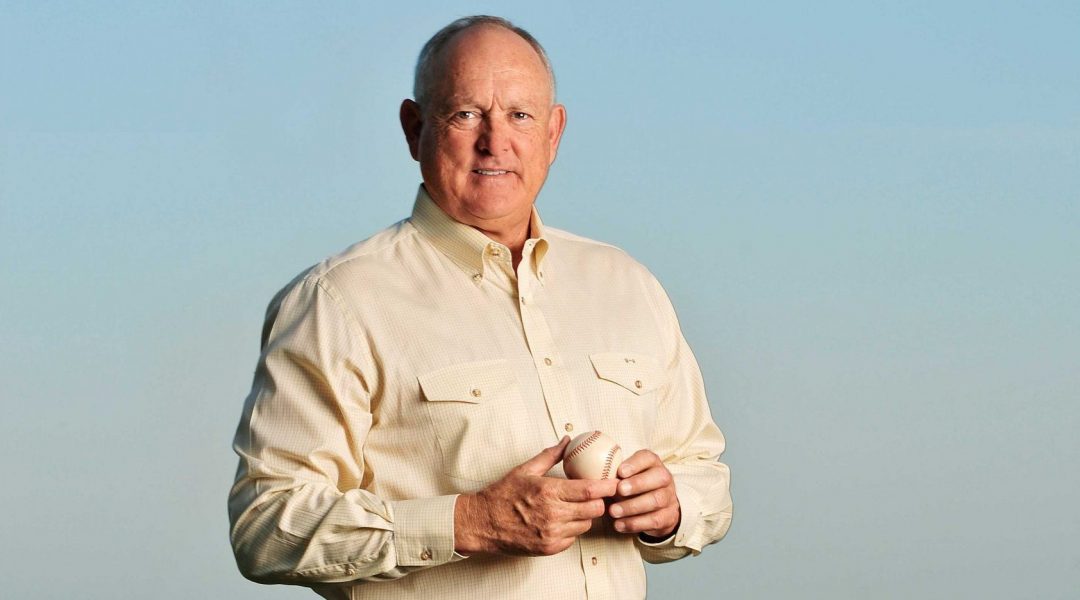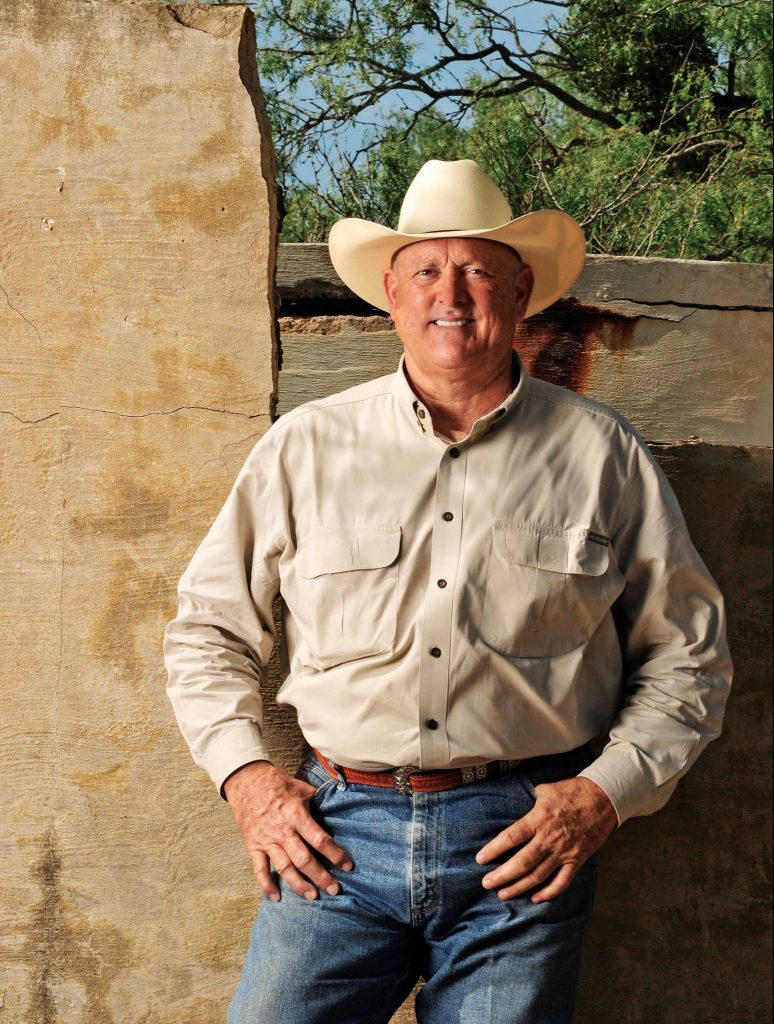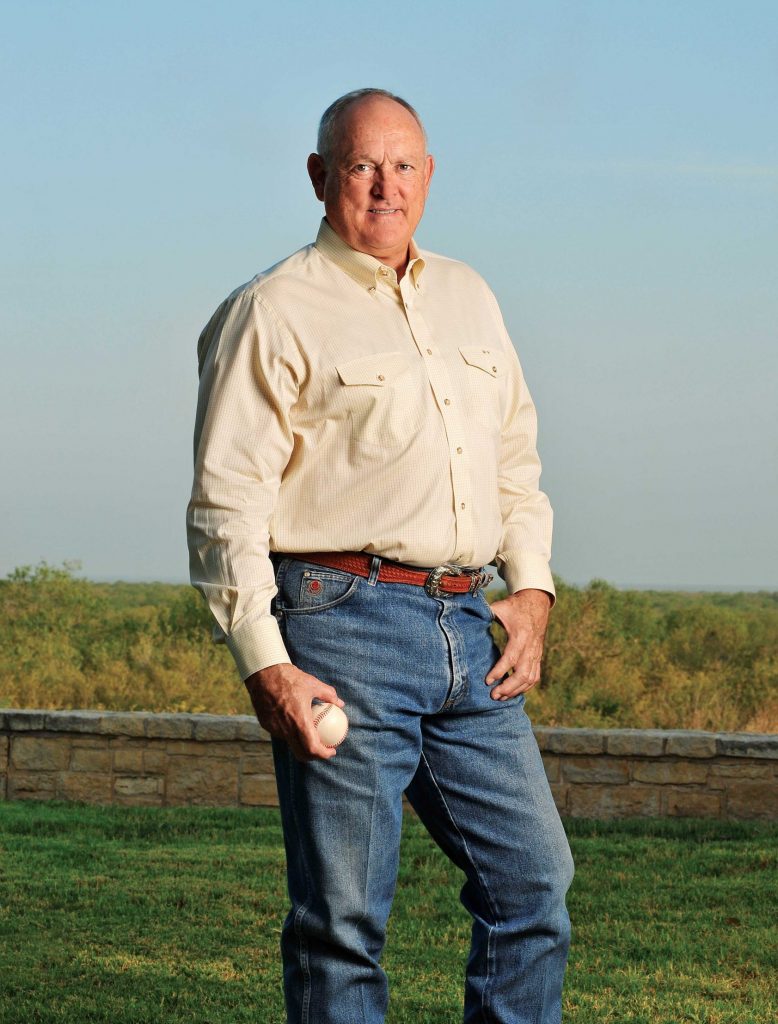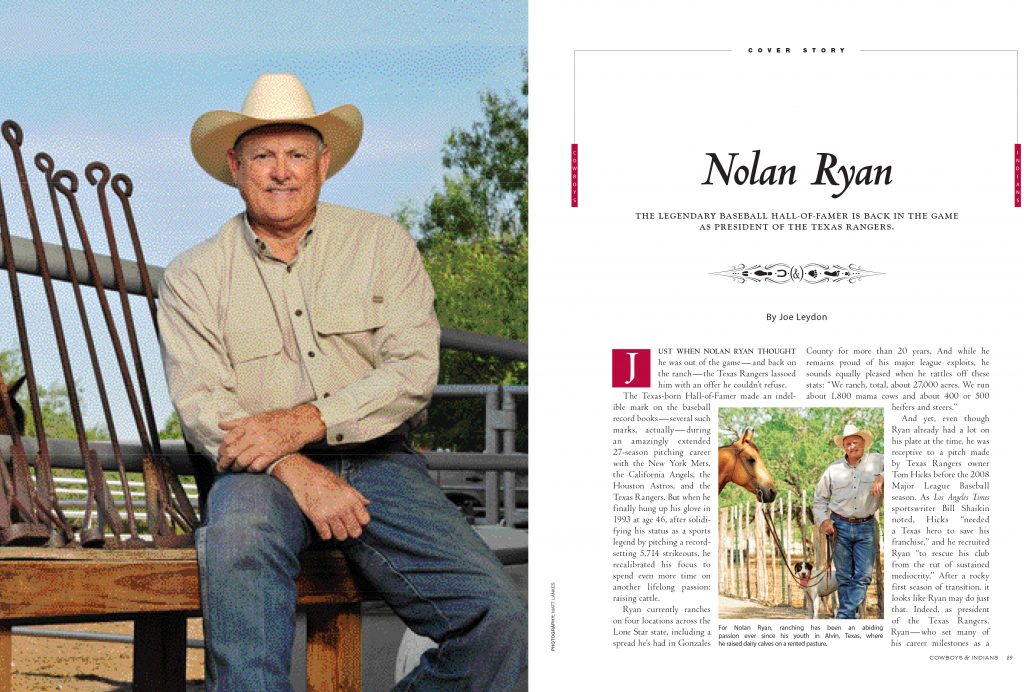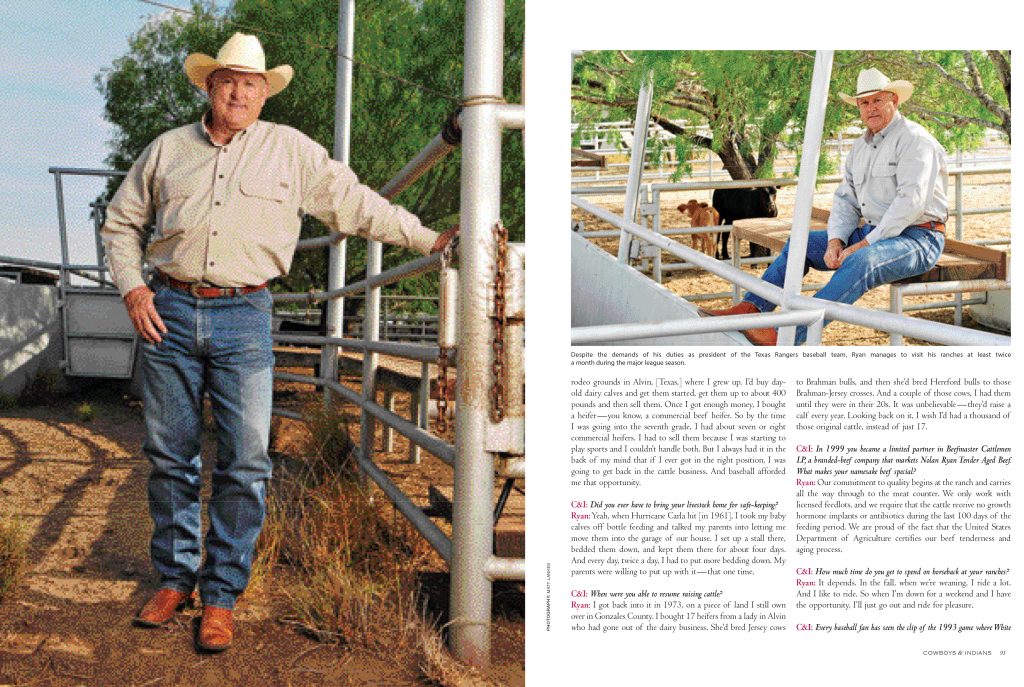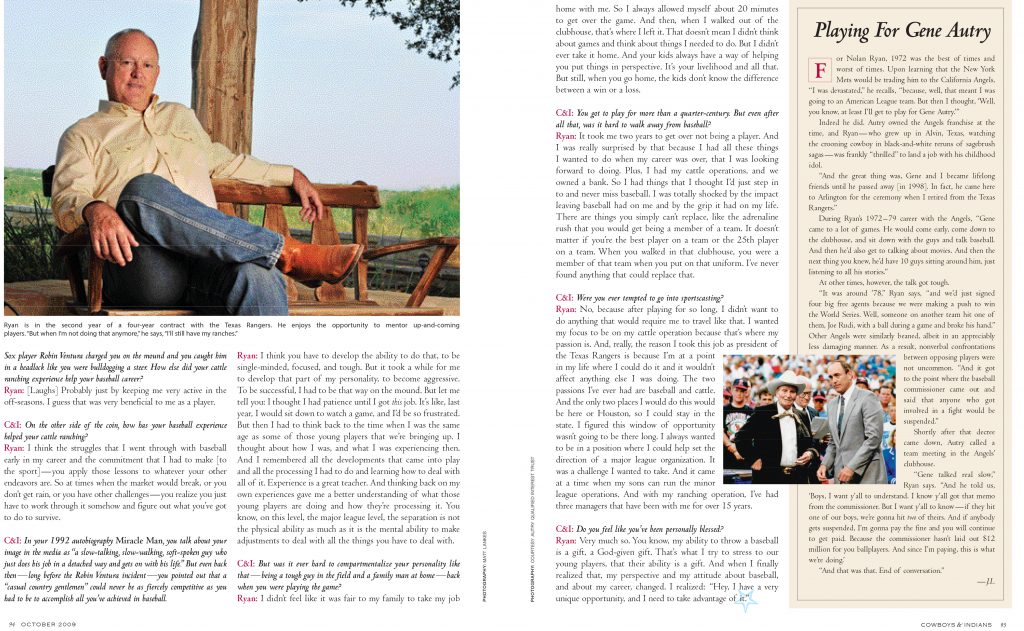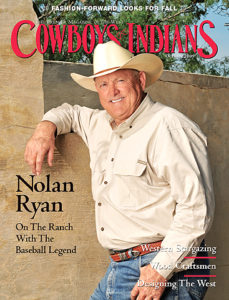The Baseball Hall-of-Famer is Back in the Game as President of The Texas Rangers.
Just when Nolan Ryan thought he was out of the game — and back on the ranch—the Texas Rangers lassoed him with an offer he couldn’t refuse.
The Texas-born Hall-of-Famer made an indelible mark on the baseball record books — several such marks, actually — during an amazingly extended 27-season pitching career with the New York Mets, the California Angels, the Houston Astros, and the Texas Rangers. But when he finally hung up his glove in 1993 at age 46, after solidifying his status as a sports legend by pitching a record- setting 5,714 strikeouts, he recalibrated his focus to spend even more time on another lifelong passion: raising cattle. Ryan currently ranches on four locations across the Lone Star state, including a spread he’s had in Gonzales County for more than 20 years. And while he remains proud of his major league exploits, he sounds equally pleased when he rattles off these stats: “We ranch, total, about 27,000 acres. We run about 1,800 mama cows and about 400 or 500 heifers and steers.”
And yet, even though Ryan already had a lot on his plate at the time, he was receptive to a pitch made by Texas Rangers owner Tom Hicks before the 2008 Major League Baseball season. As Los Angeles Times sportswriter Bill Shaikin noted, Hicks “needed a Texas hero to save his franchise,” and he recruited Ryan “to rescue his club from the rut of sustained mediocrity.” After a rocky first season of transition, it looks like Ryan may do just that. Indeed, as president of the Texas Rangers, Ryan— who set many of his career milestones as a player with the team from 1989 to 1993 — now looks forward to seeing his boys of summer chase after the division pennant en route to baseball’s fall classic.
Married since 1967 to his high school sweetheart, the former Ruth Holdorff, Ryan maintains a home in Fort Worth, Texas, during the baseball season. He regularly consults with his two sons, Robert Reid and Nolan Reese, who are co- owners and, respectively, CEO and CFO of Ryan-Sanders Baseball, the company that operates Ryan’s two minor league teams, the Round Rock Express of the Pacific Coast League and the Corpus Christi Hooks of the Texas League. (Both teams are affiliated with the Houston Astros.) But there’s another team that commands even more of his attention these days.
Ryan can watch all the Texas Rangers home-field action through the massive window of his office on an upper floor of the Ballpark at Arlington. That’s where we caught up with him a few days after the All-Star break to chat about his experiences as a real-life cowboy—one recently honored during the 2009 Western Heritage Awards at the National Cowboy & Western Heritage Museum — and a flame- throwing legend.
Cowboys & Indians: This is a great view. Do you ever come in here on your days off and just catch a game?
Nolan Ryan: [Laughs] Sure. It’s one of the perks of the job.
C&I: So what’s it like being on the other side of the desk all these years after you played for the Texas Rangers?
Ryan: I have to say, your perspective when you’re in uniform down there regarding what goes on up here is totally different than what really goes on up here. You really have a lack of knowledge about all the moving parts of a Major League Baseball organization. When [team owner Tom Hicks] asked me to come over here and be president, I was hoping that he was talking about the role Hal Smith plays with the Astros, where he’s just president of the baseball operations. But no, he wanted me to be president of the whole organization. And the biggest challenge we had here was the lack of attendance — and poor play. We really needed to address all aspects of the organization. So it’s been a real learning curve for me. See, I’d been involved in businesses, banks, minor this magnitude before.
C&I: What aspect of the job takes up most of your time?
Ryan: I think most people probably think I spend the majority of my time with the baseball side of it — the development side of it, from our minor league system — and especially with the pitchers, because of my background. But I would say 80 percent of my time is spent on the business side of it — figuring out what we need to do to run more efficiently and how to put more people in the stands. But, of course, what drives that is how the team performs on a nightly basis.
C&I: Does a job like this force you to spend less time with your ranch properties?
Ryan: Well, my agreement when I came on was that I would be here 60 percent of the time and that I would try to be here for every home game. When the team is on the road, through TV and radio I’m able to follow the games. But that’s when I try to get to my office in Round Rock and get to the ranches at least twice a month. And during the off-season, I spend a lot more time there.
C&I: You don’t come from a long line of cattle ranchers, do you?
Ryan: Not really. But as far back as I can remember, as a kid, that’s something I’ve always had an interest in. It’s been a passion of mine my whole life.
C&I: No kidding. You started raising cattle when you were about 8 years old, right?
Ryan: That’s true. I rented a pasture from the VFW over at the rodeo grounds in Alvin, [Texas,] where I grew up. I’d buy day- old dairy calves and get them started, get them up to about 400 pounds and then sell them. Once I got enough money, I bought a heifer — you know, a commercial beef heifer. So by the time I was going into the seventh grade, I had about seven or eight commercial heifers. I had to sell them because I was starting to play sports and I couldn’t handle both. But I always had it in the back of my mind that if I ever got in the right position, I was going to get back in the cattle business. And baseball afforded me that opportunity.
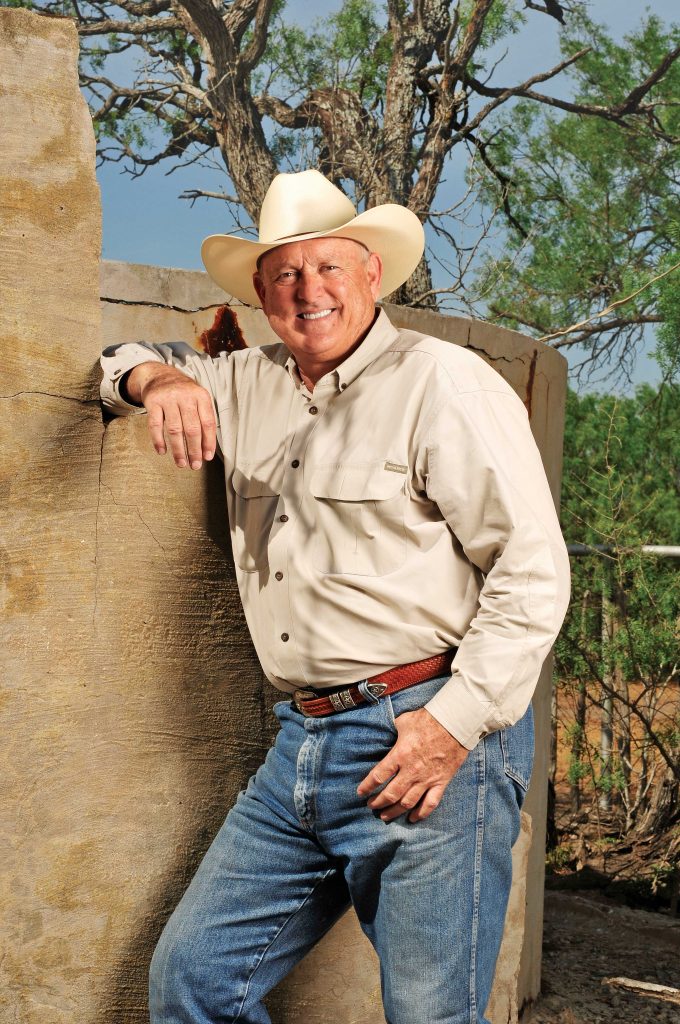
C&I: Did you ever have to bring your livestock home for safe-keeping?
Ryan: Yeah, when Hurricane Carla hit [in1961],I took my baby calves off bottle feeding and talked my parents into letting me move them into the garage of our house. I set up a stall there, bedded them down, and kept them there for about four days. And every day, twice a day, I had to put more bedding down.
My parents were willing to put up with it—that one time.
C&I: When were you able to resume raising cattle?
Ryan: I got back into it in 1973, on a piece of land I still own over in Gonzales County. I bought 17 heifers from a lady in Alvin who had gone out of the dairy business. She’d bred Jersey cows to Brahman bulls, and then she’d bred Hereford bulls to those Brahman-Jersey crosses.
And a couple of those cows, I had them until they were in their 20s. It was unbelievable — they’d raise a calf every year. Looking back on it, I wish I’d had a thousand of those original cattle, instead of just 17.
C&I: In 1999 you became a limited partner in Beefmaster Cattlemen LP, a branded-beef company that markets Nolan Ryan Tender Aged Beef. What makes your namesake beef special?
Ryan: Our commitment to quality begins at the ranch and carries all the way through to the meat counter. We only work with licensed feedlots, and we require that the cattle receive no growth hormone implants or antibiotics during the last 100 days of the feeding period. We are proud of the fact that the United States Department of Agriculture certifies our beef tenderness and aging process.
C&I: How much time do you get to spend on horseback at your ranches?
Ryan: It depends. In the fall, when we’re weaning, I ride a lot. And I like to ride. So when I’m down for a weekend and I have the opportunity, I’ll just go out and ride for pleasure.
C&I: Every baseball fan has seen the clip of the 1993 game where White Sox player Robin Ventura charged you on the mound and you caught him in a headlock like you were bulldogging a steer. How else did your cattle ranching experience help your baseball career?
Ryan: [Laughs] Probably just by keeping me very active in the off-seasons. I guess that was very beneficial to me as a player.
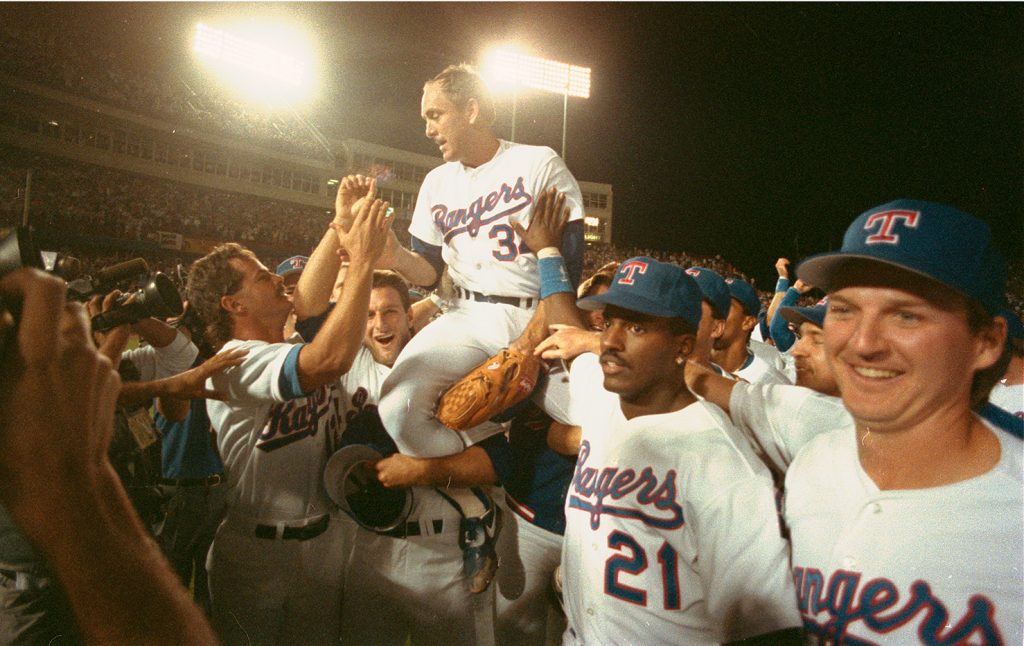
Nolan Ryan carried on shoulders of teammates, Rangers vs. Toronto Blue Jays baseball; Ryans' 7th no-hitter, 05/02/1991
C&I: On the other side of the coin, how has your baseball experience helped your cattle ranching?
Ryan: I think the struggles that I went through with baseball early in my career and the commitment that I had to make [to the sport] — you apply those lessons to whatever your other endeavors are. So at times when the market would break, or you don’t get rain, or you have other challenges — you realize you just have to work through it somehow and figure out what you’ve got to do to survive.
C&I: In your 1992 autobiography Miracle Man, you talk about your image in the media as “a slow-talking, slow-walking, soft-spoken guy who just does his job in a detached way and gets on with his life.” But even back then—long before the Robin Ventura incident—you pointed out that a “casual country gentlemen” could never be as fiercely competitive as you had to be to accomplish all you’ve achieved in baseball.
Ryan: I think you have to develop the ability to do that, to be single-minded, focused, and tough. But it took a while for me to develop that part of my personality, to become aggressive. To be successful, I had to be that way on the mound. But let me tell you: I thought I had patience until I got this job. It’s like, last year, I would sit down to watch a game, and I’d be so frustrated. But then I had to think back to the time when I was the same age as some of those young players that we’re bringing up. I thought about how I was, and what I was experiencing then. And I remembered all the developments that came into play and all the processing I had to do and learning how to deal with all of it. Experience is a great teacher. And thinking back on my own experiences gave me a better understanding of what those young players are doing and how they’re processing it. You know, on this level, the major league level, the separation is not the physical ability as much as it is the mental ability to make adjustments to deal with all the things you have to deal with.
C&I: But was it ever hard to compartmentalize your personality like that — being a tough guy in the field and a family man at home — back when you were playing the game?
Ryan: I didn’t feel like it was fair to my family to take my job home with me. So I always allowed myself about 20 minutes to get over the game. And then, when I walked out of the clubhouse, that’s where I left it. That doesn’t mean I didn’t think about games and think about things I needed to do. But I didn’t ever take it home. And your kids always have a way of helping you put things in perspective. It’s your livelihood and all that. But still, when you go home, the kids don’t know the difference between a win or a loss.
C&I: You got to play for more than a quarter-century. But even after all that, was it hard to walk away from baseball?
Ryan: It took me two years to get over not being a player. And I was really surprised by that because I had all these things I wanted to do when my career was over, that I was looking forward to doing. Plus, I had my cattle operations, and we owned a bank. So I had things that I thought I’d just step in to and never miss baseball. I was totally shocked by the impact leaving baseball had on me and by the grip it had on my life. There are things you simply can’t replace, like the adrenaline rush that you would get being a member of a team. It doesn’t matter if you’re the best player on a team or the 25th player on a team. When you walked in that clubhouse, you were a member of that team when you put on that uniform. I’ve never found anything that could replace that.
C&I: Were you ever tempted to go into sports casting?
Ryan: No, because after playing for so long, I didn’t want to do anything that would require me to travel like that. I wanted my focus to be on my cattle operation because that’s where my passion is. And, really, the reason I took this job as president of the Texas Rangers is because I’m at a point in my life where I could do it and it wouldn’t affect anything else I was doing. The two passions I’ve ever had are baseball and cattle. And the only two places I would do this would be here or Houston, so I could stay in the state. I figured this window of opportunity wasn’t going to be there long. I always wanted to be in a position where I could help set the direction of a major league organization. It was a challenge I wanted to take. And it came at a time when my sons can run the minor league operations. And with my ranching operation, I’ve had three managers that have been with me for over 15 years.
C&I: Do you feel like you’ve been personally blessed?
Ryan: Very much so. You know, my ability to throw a baseball is a gift, a God-given gift. That’s what I try to stress to our young players, that their ability is a gift. And when I finally realized that, my perspective and my attitude about baseball, and about my career, changed. I realized: “Hey, I have a very unique opportunity, and I need to take advantage of it.”
As featured in our October 2009 issue
Please call our office to purchase your own copy: (214) 750-8222






